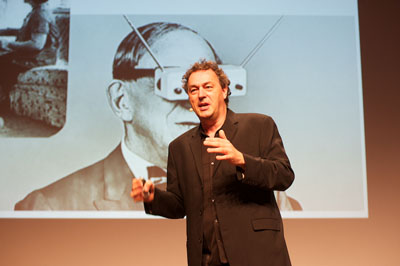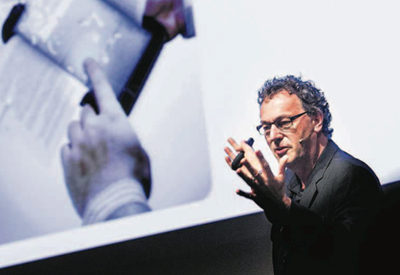Business & Startups
Global job revolution Digitalization and artificial intelligence

Gerd Leonhard: "Predicting how we will live and work in 35 years is impossible."
Gerd Leonhard is a futurist and future consultant, international keynote speaker and strategy coach, author, founder and CEO of 'The Futures Agency'. He talks to Langmeier Software about future technologies, the loss of privacy and the job market of the future.
Mr. Leonhard, where do you see the most groundbreaking changes between today and the year 2049?
First of all. As a futurist and future consultant, I try to recognize future trends and developments, bring them together and identify possible future scenarios over the next five to seven years. The art here is to observe well, to listen and to reconcile many different data and opinions in order to show my clients a plausible and preferred path into the future.
To come back to your question: Predicting how we will live and work in 35 years is impossible. What we can say today is that we are living in a time where the use of new technologies is accelerating extensively. We are experiencing a kind of hyper-efficiency that brings with it ever better software, cheaper devices and technologies and high-speed mobile broadband. Digital applications and the Internet are currently not only conquering industry - keyword: Industry 4.0 - but have also conquered their place in our everyday lives. Suddenly, things are possible that until recently were considered dreams of the future. Robots assist doctors during operations, we no longer have to type anything but ask our cell phone (Siri, Google Now) for directions, and the development of artificial intelligence (AI) is also making huge progress. And we have not reached the end of the development process.
In a few years' time, our consumption, leisure and shopping habits will look completely different. The economy around us is changing exponentially. This has consequences: Traditional trades and services are disappearing. The traditional cab industry and its possible displacement by the much more practical "Uber" is a classic example of digital Darwinism, which will increase.
Many technologies can no longer function without data collection. I see the world heading towards a complete abandonment of individual privacy. How do you see that? Does privacy look as bleak as I imagine?
Mark Zuckerberg of Facebook predicted in 2010 that privacy would no longer be a social norm. Today we see people voluntarily giving up their privacy for cool platforms and networks. They don't read the small print and the terms of use, otherwise they would know that they are paying with their data to use the supposedly free platforms on the Internet. The Internet companies then know what is good for me and supply me with offers without being asked. I assume that data will continue to be exchanged openly in the future. But despite statements to the contrary, for example from Google, I believe that people's privacy is not yet lost. Of course, collecting data also harbors the risk of misuse. I am therefore in favor of a digital social contract - at state or global level - that regulates how our data is handled.
What impact does technology's data collection mania have on people's social behavior?
A big data and big internet society is currently emerging, and it is not yet clear what users will actually accept. For example, if we use our cell phone to reveal where we park our car and this is relevant for my car insurance premium, then I am convinced that there will be resistance. The fact is that data does not always reflect the whole of reality, including human reality. Blindly trusting the data (the so-called data hybris) therefore does not always make sense. One example is finding a partner on the internet: Based on the other person's data, we believe we know whether this person is right for us. But there are many other aspects that cannot be quantified at all, even with big data. Generally speaking, technology and the data tsunamis will mean that in future we may have to say goodbye to things that we still take for granted today: in future, we will no longer check ourselves to see if we are fit, but leave this to the Nike Fluid Band or Jam App - a terrifying thought for many of us. We only approach our potential partners virtually and no longer know how to address the person in the train compartment next to us. It could be heaven or hell.
 "Digital assistants will replace accountants, financial data analysts and supermarket cashiers in the next 10 to 20 years."
"Digital assistants will replace accountants, financial data analysts and supermarket cashiers in the next 10 to 20 years."I find it difficult to separate the important from the unimportant among the wealth of information available today. Does the information-heavy nature of the current age lead to a kind of "knowledge gap" between those who can filter important information and those who cannot?
The Internet is democratizing knowledge in the world and making it available to everyone. Never before have so many people had access to so much information. Now we just have to learn how to use it, but jobs are being created for this. For many people, it is indeed becoming increasingly difficult to separate the important from the unimportant - because the noise is sometimes unbearable. Many people like to get lost on the Internet with its wealth of information. Advising people on how to use the Internet is also a profession that is likely to become established. I doubt that there will be a widening "knowledge gap". It is more conceivable that a "filter bubble" or "information bubble" will occur: websites use algorithms to predict which information could be relevant for the user. This effectively isolates users in a "bubble" in which there is no room for information that contradicts the user's views.
The rationalization of the workforce seems to be entering another round. Today, we check in at the airport using a machine - and we pay at the grocery store without a cashier. Which jobs are at risk?
Simple, repetitive and many manual jobs can also be done by machines. Intelligent software, robots and digital assistants will replace accountants, financial data analysts and supermarket cashiers, for example, in the next 10 to 20 years. In Europe, up to 65% of all current jobs are at risk. The fact is that we are facing a global job revolution through digitalization, automation and artificial intelligence.
Can the jobs lost in this way be replaced by new jobs created in the future?
Partly for sure, and partly not at all. In Switzerland, we certainly have a good chance, but not so much in China or India. However, with the disappearance of hundreds of millions of jobs, new professions are also being created. Half of the professions that will exist in 2030 have not yet been invented. The following jobs will already exist in a few years' time:
- Privacy managers: they support people and companies in regaining their data sovereignty. If necessary, they will also free data held hostage by institutions and the media for their customers and help them to change or delete personal traces on the internet and in search engines.
- Artificialintelligence supervisors: In future, artificial intelligence supervisors will monitor ultra-smart software, robots and our digital assistants. If necessary, they will also set them up correctly and ensure that the machines do not want to do away with us altogether sooner or later.
- Offline therapist: Since the triumph of social media and mobile computing, more and more people are struggling with the tyranny of being constantly online, where they are overwhelmed with breaking news, emails, messages, push information and updates. The Offline Therapist helps people find the balance between being reachable and being themselves and shows them how to enjoy being offline as a luxury.
- Social graph analysts and branded story designers: Today's marketing professionals are becoming branded story designers who place appropriate stories about brands and products on social networks. The classic advertising manager will soon be a thing of the past.
- Virtual tour guide: Sights such as natural spectacles, cities and traditions can soon be experienced at home, conveniently and three-dimensionally, as if you were there yourself. The technology already exists. The virtual tour guide takes people on adventurous journeys and guarantees that nothing goes wrong.
Basically, the following applies to the job market of the future: we should advise our children to take up professions in which the right side of the brain, where creativity is located, is used - the more "human" the jobs are, the better chances they will have in the job market of the future.


 Gerd Leonhard: "Predicting how we will live and work in 35 years is impossible."
Gerd Leonhard: "Predicting how we will live and work in 35 years is impossible." "Digital assistants will replace accountants, financial data analysts and supermarket cashiers in the next 10 to 20 years."
"Digital assistants will replace accountants, financial data analysts and supermarket cashiers in the next 10 to 20 years."